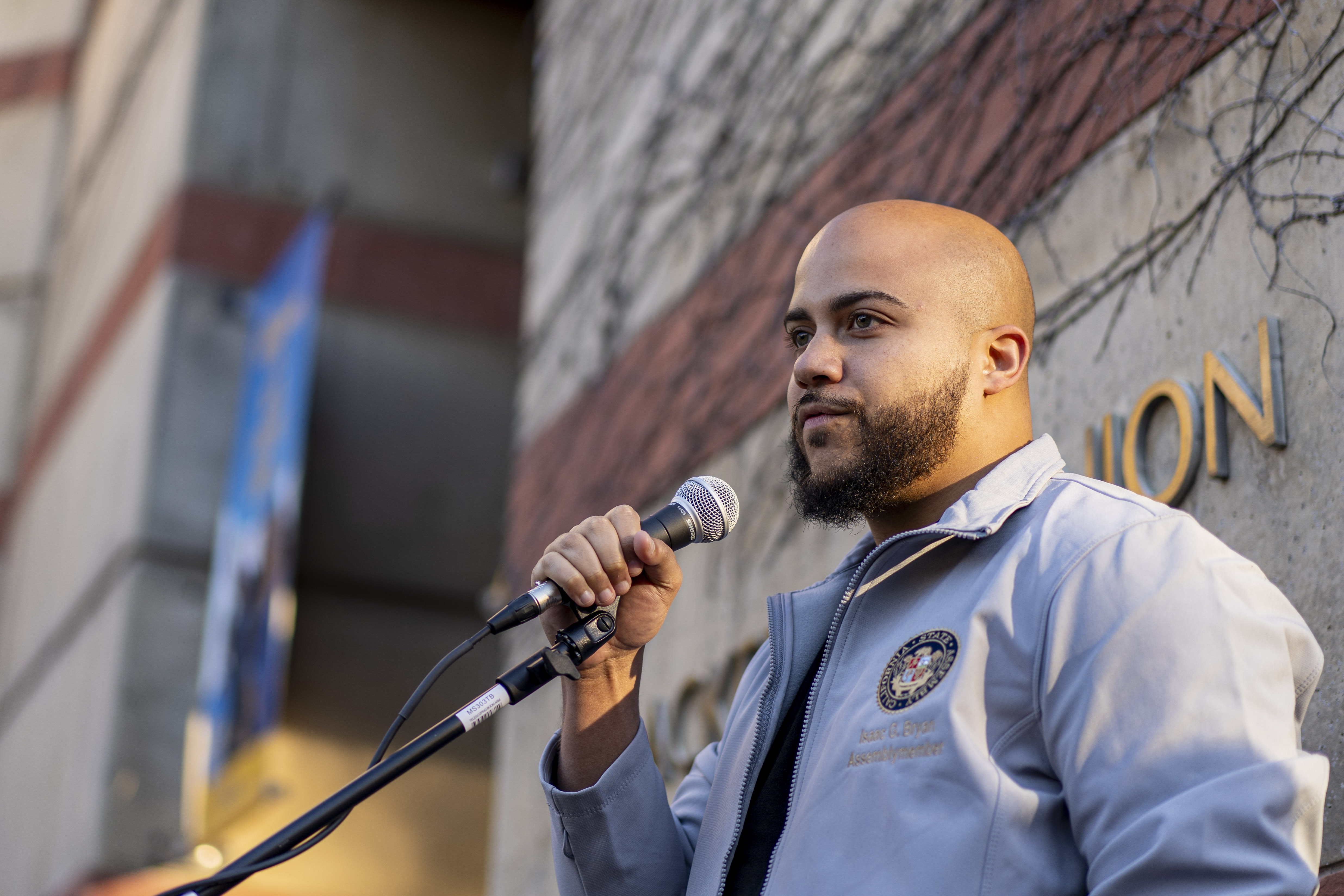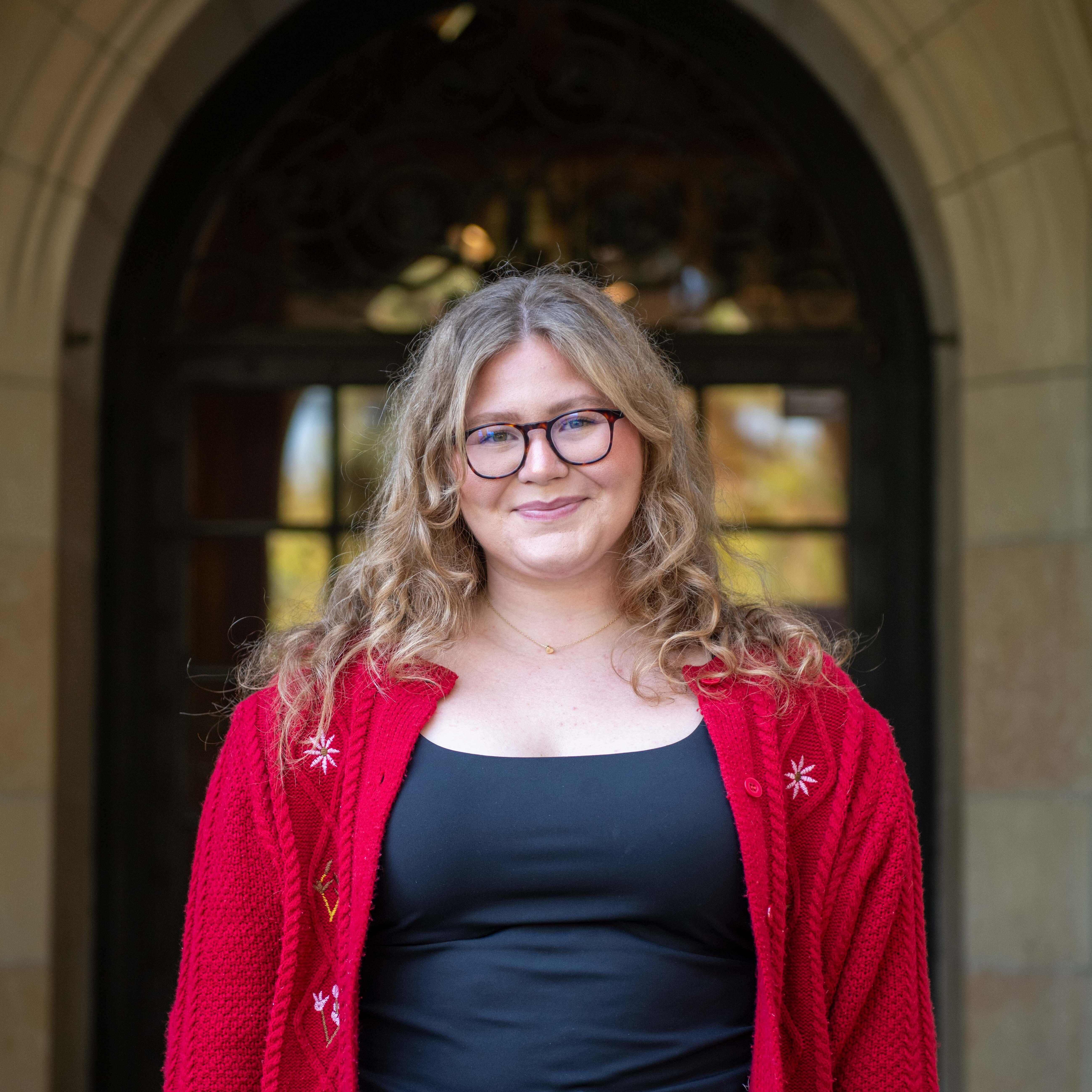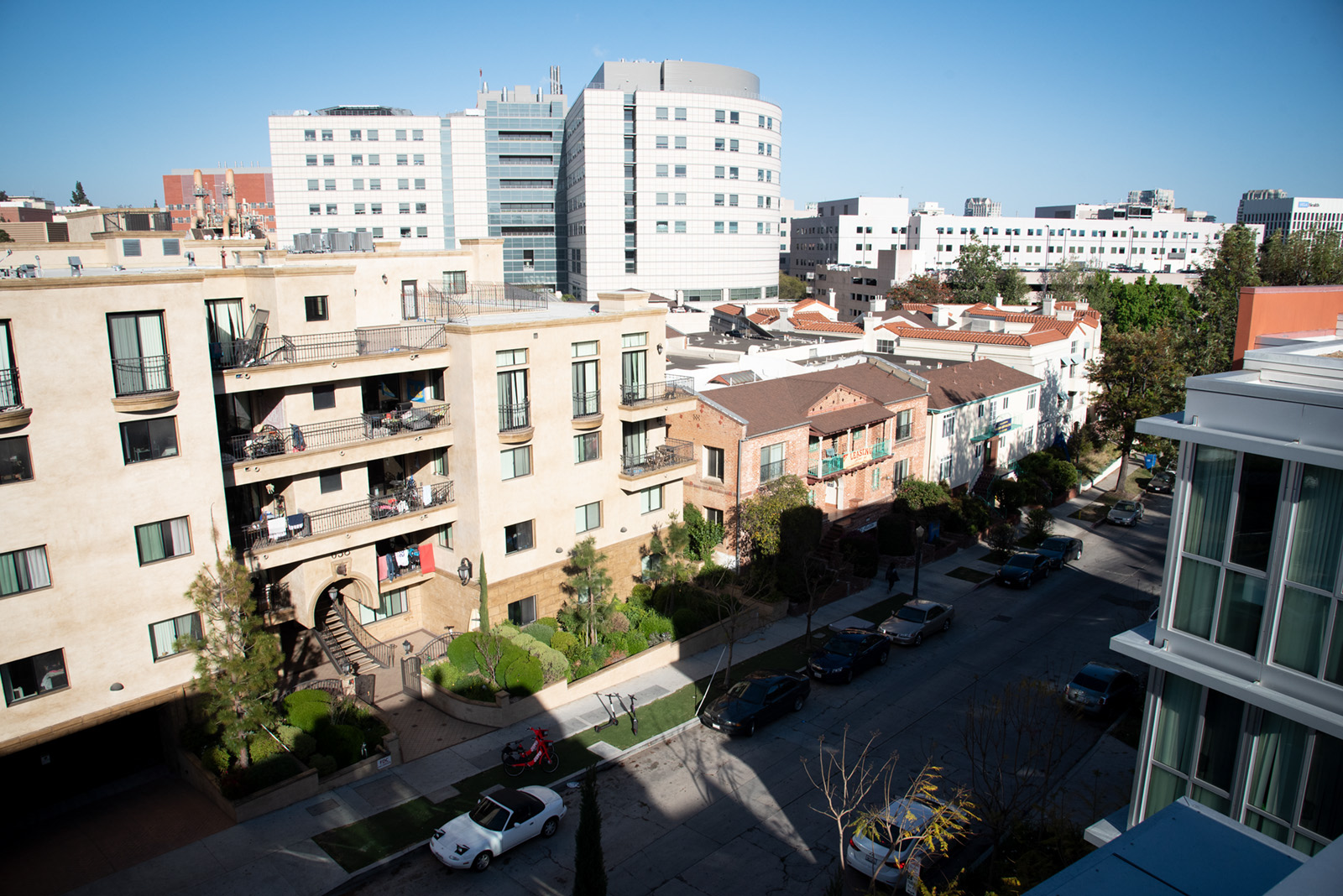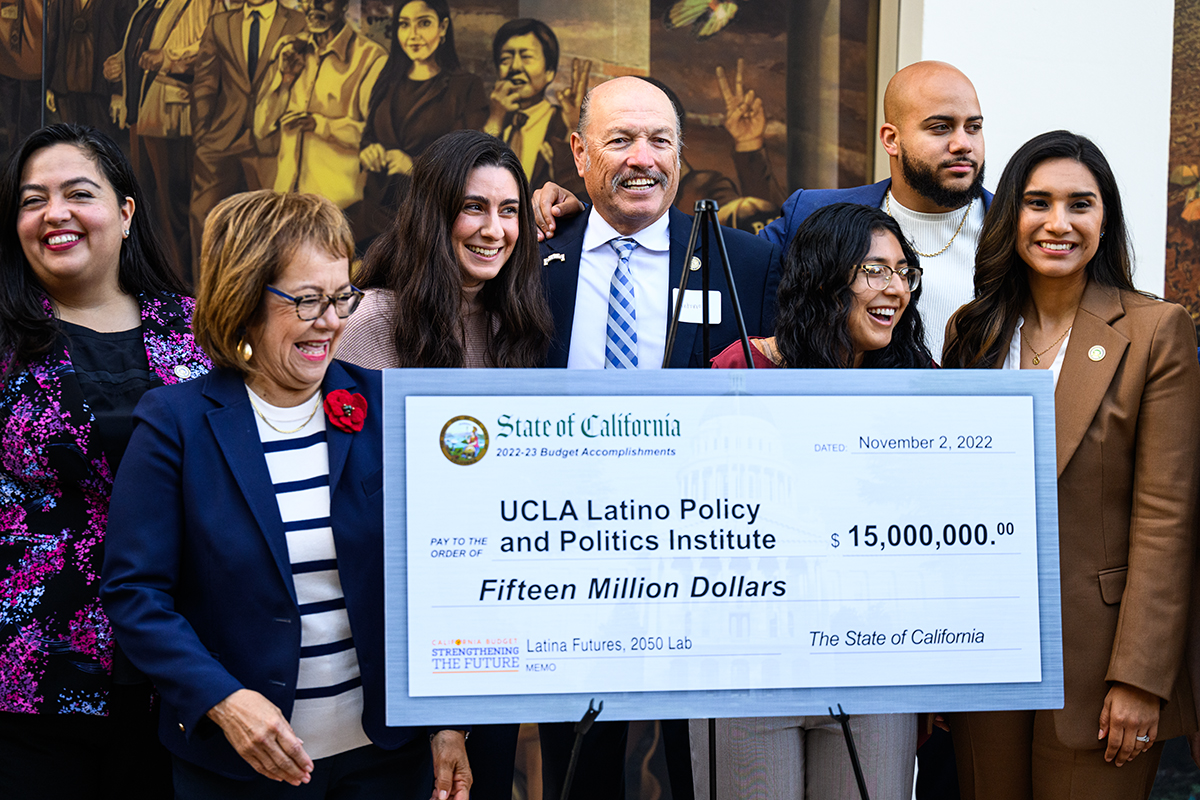UCLA alumnus Isaac Bryan discusses new role as state assembly majority leader

Photo of California State Assembly Majority Leader Isaac Bryan speaking at the UCLA academic workers’ strike in November. Daily Bruin sat down with Bryan and asked him about his experience in his new role and how his time at UCLA impacted his career. (Brandon Morquecho/Assistant Photo editor)
This post was updated July 23 at 8:49 p.m.
Assemblymember Isaac Bryan was sworn into the California State Assembly as majority leader July 3. Bryan, who is a UCLA alumnus, sat down with the Daily Bruin to discuss his new role and how his experience at UCLA impacted his journey into politics.
This interview has been edited for length and clarity.
[Related: UCLA alum Isaac Bryan to represent District 54 following special election]
DB: What are your new responsibilities as majority leader, and how are you acclimating to them thus far?
Isaac Bryan: My new responsibilities are to think broadly about the direction of California as a whole and the needs of Speaker Robert Rivas and our caucus to move those priorities forward. It’s less about my impact as an individual legislator and more about the impact of the collective and my role in it.
DB: What has your path from UCLA to majority leader of the state assembly been like?
IB: It’s been a very interesting path. One that I can honestly say was that I didn’t map this out or plan this out directly. It was really about doing the work and trying to make a difference for the things that I cared about the most, or the things that I felt like were impacting the community in a way that required a movement-oriented, research-oriented or policy-oriented response.
When I was at UCLA, I felt like I was creating some of the research and the data and the evidence that was needed by grassroots organizers and elected officials to make smart decisions. As a community organizer, I knew what it was like to rely on good evidence and data and research and to also build inside and outside relationships with elected officials. Now as an elected official, I feel like I’ve crossed over into just another one of the necessary positions to make change. And as majority leader, it’s just a reminder that if you stay rooted in the values that you start with and you stay true to the people-centered reasons that push you to be wherever you’re supposed to be, you’ll end up exactly where you need to be.
DB: Do you think your time and work at UCLA, such as on the Black Policy Project, prepared you well for your current position as majority leader?
IB: Absolutely. My time at UCLA taught me a lot about how often we make political decisions absent of the necessary research and critical thought needed to make sure that the policy outcomes do more good than harm. Having had that experience first of learning and studying at UCLA – understanding what data and evidence and empirical research can and should look like for social good – it’s made me a more thoughtful elected official and a more effective policymaker.
DB: What experience at UCLA do you believe defined your aspirations in state government?
IB: When I was at UCLA, I was at the Ralph J. Bunche Center Black Policy Project. The center was born out of student protests over 50 years ago. The research center was operating under a shoestring budget, even after 50 years of existence.
I went to the state legislature with some of our research, trying to get the necessary support for us to continue to do this work. While I was at UCLA, I had a number of elected officials, including the in-state budget chair, Holly Mitchell (now a Los Angeles county supervisor), who believed in quality research, impact and change. A budget allocation of $1.8 million was given to the Bunche Center directly.
That showed me the power of not just policymaking and making sure that we craft policy that does the most good, but also making sure that we invest our resources in people-centered institutions that can make that difference, whether it’s community-based organizations or local government infrastructure, or in this case, it was higher education infrastructure.
Being someone who can help steer those resources towards the areas that help the most people is not something I had thought about in the same way until we successfully advocated for that financial allocation for the Bunche Center. I think that was the moment where I realized that the gap between what was happening in Sacramento and what’s happening in the everyday lives of people is too big, and I wanted to be somebody who closed that gap.
DB: Your previous work at UCLA revolved heavily around incarceration. What do you believe could be the most effective change made in state legislation concerning that issue?
IB: We’re on track to close another five prisons. We started to think about what mass incarceration looks like at the state level. We were under a consent decree before I was in office because our prisons were overcrowded, and so we had to constitutionally scale that back. Building out alternatives to harm that are rooted in care and accountability and healing and restoration, I think it’s something that the state is on the pathway to doing.
I think one of the big ones is, following the murder of George Floyd, we passed Senate Bill 2, which established a decertification process for law enforcement. You used to be able to get fired from the LAPD, for example, and then get hired at the Culver City Police Department. And because of SB 2, there is now a decertification process in California, by which if you are found to be unsuitable for the profession, you can be decertified from being a part of law enforcement altogether. I think that’s a major policy change, and I was grateful to be in the legislature when it first hit.
DB: Are there any new topics that you think will become central to California politics within the next couple of years during your service?
IB: Protecting our planet and shifting away from fossil fuels and toward a renewable future is something that is multigenerational and always has to stay a critical focus. I think that also includes protecting and conserving natural resources – water, drought and infrastructure – I think all of that is critically important.
Housing and homelessness are issues at the forefront. We have a need for more student housing and for more workforce housing, for more housing of all types, in all income levels, everywhere. So there’s a lot of work that we’ve got to do to build a California that allows for everybody to thrive and experience the economic opportunities they should, and I’m looking forward to being a part of that change for as long as the people will have me.
DB: How will you represent the needs of students, and less broadly, Black students, whom you’ve focused on so much in your work and during your service?
IB: We just voted on a bill by Senator (Angelique) Ashby to make sure that college is more affordable for former foster youth. We’ve got to do all that we can to make sure that students who studied at the elementary, middle school and high school level in California have an opportunity to earn their higher education here in California as well, and that’s not always the case. We’ve got to build up our community college pipeline and make sure that college remains affordable.
One of the bills that we’ve got this year is that right now in California – if you have CalFresh, CalWorks, any kind of social services – your need-based scholarships don’t count against your eligibility. If you’re getting CalFresh and you get a scholarship because you’re in need, you can still keep your CalFresh, but if you get a merit-based scholarship, it can be counted against your eligibility, and that’s wrong. We have a bill to change that, so students aren’t disincentivized, or having to choose between doing well in school and receiving financial aid, versus receiving the other types of aid that you need to foundationally survive.
DB: Do you have any advice for current college students aspiring to be in your position?
IB: I would say don’t aspire to be an elected official. Aspire for the service and aspire to make the change, and if that change-making process leads to a pathway running for office, stay rooted in the values that you had while you were at UCLA. Remember the things that you thought about and cared about and knew were important before you had any kind of political pressures, special interests or other calculations you had to make. Stay that person.
The time that you’re spending as a student on campus is the time you’re spending to develop your most critical and free thinking. Don’t lose that along your journey, and you’ll end up exactly where you need to be.







